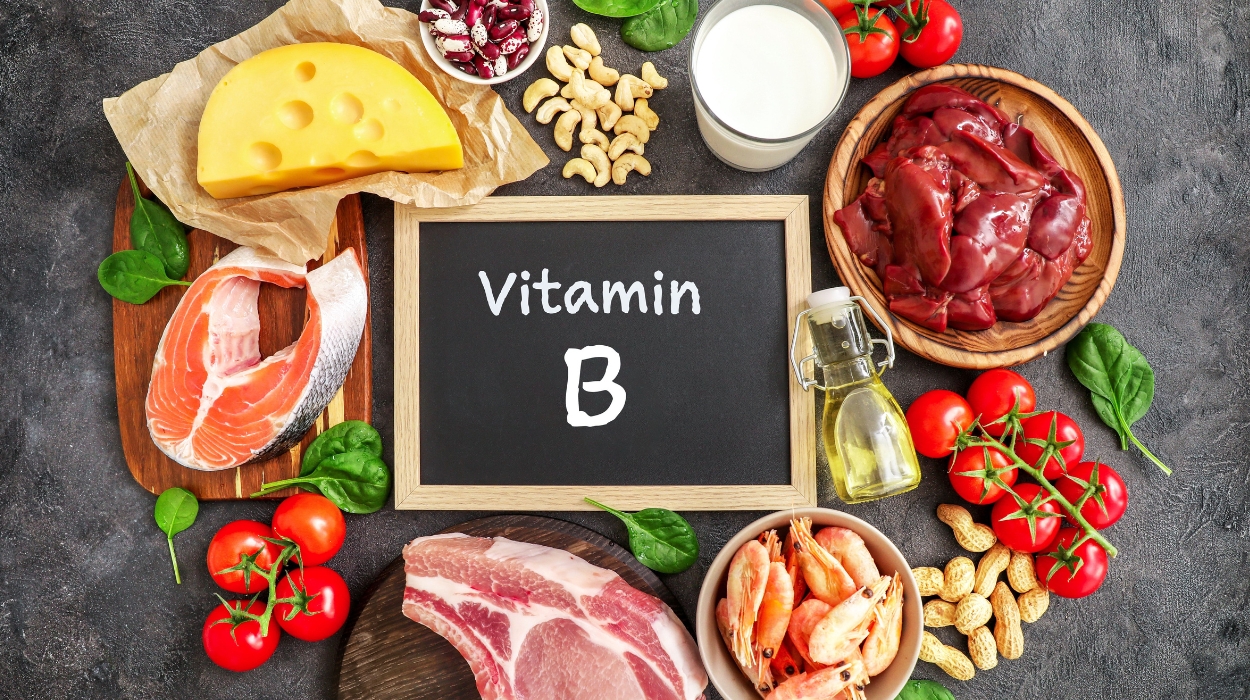Maintaining a healthy gut is crucial for overall well-being and digestive function. Research[1] has demonstrated that the gut microbiome,[2] the natural ecosystem of bacteria living in the gastrointestinal tract, plays a significant role in maintaining health. If the good bacteria and bad bacteria in the gut become imbalanced, digestive issues can occur.
Research[3] has linked gastrointestinal disorders such as inflammatory bowel disease,[4] irritable bowel syndrome, and ulcerative colitis to disturbances in gut bacteria.
Healing of the gut flora can help restore balance[5] and potentially reverse or reduce symptoms of digestive discomfort. This applies to both individuals with gastrointestinal disorders and those who experience occasional discomfort.
In this article, we will explore the top four vitamins for gut health: vitamin C, vitamin D, vitamin A, and B vitamins. We will look at the research behind how each of these vitamins supports a healthy gut flora and helps improve gut health.
Gut Health Vitamins
- The best vitamins for gut health include vitamin C, vitamin D, vitamin A, and the B vitamins. These vitamins help to improve digestive health by improving the gut flora, restoring the intestinal barrier, and improving immune function.
- Gut-friendly vitamins can be added through specific food choices or supplementation.
- Other tips to promote vibrant digestion include incorporating probiotics into your diet, eating healthy, reducing stress, limiting processed foods, and drinking water.
Best Vitamins For Gut Health
These four crucial vitamins play an essential role in restoring gut health through various mechanisms that replenish the beneficial bacteria in the gut. These vitamins can be obtained through dietary sources alone or health and wellness supplements to reap the benefits of healing the digestive system.
Vitamin C

Vitamin C is not only known for its positive immune system effects but also for its impact on gut health. This is one of the top vitamins to take if you are wondering what vitamins are good for gut health.
Repair Gut Lining
This powerful antioxidant[6] can help reduce inflammation and repair[7] the gut lining. Research[8] has demonstrated that the breakdown of the gut lining can cause a condition known as leaky gut. In this condition, the breakdown of the intestinal lining leads to molecules “leaking” into the bloodstream, causing an immune system reaction. Restoring the gut lining can help reduce the immune system reaction associated with a leaky gut.
Antibacterial Properties
Vitamin C can kill harmful[1] gut microbes such as bacteria, parasites, fungi, and viruses, making it crucial to restoring gut homeostasis. Once harmful microbes are destroyed, beneficial bacteria can begin to thrive.
Restore Intestinal Flora
Vitamin C also directly supports the growth of beneficial bacteria. Research[9] has demonstrated that supplementation with 1,000 mg of vitamin C modulates gut bacteria, increasing the amount of beneficial bacteria with anti-inflammatory properties. Increases in the good bacteria, bifidobacterium[10] spp, can prevent[11] gastrointestinal infections, improve bowel movement regularity, and reduce symptoms of inflammatory bowel disease. Vitamin C’s impact on bowel movements also make it an excellent addition to an irritable bowel syndrome diet.
You can find vitamin C in a variety of fruits and vegetables. According to the National Institutes of Health,[12] bell peppers, broccoli, and citrus fruits like oranges, grapefruits, and kiwis are high in this potent vitamin.
To add more of this important vitamin to your diet, vitamin C supplementation can boost levels. Supplements usually contain vitamin C in ascorbic acid, which is as easily absorbed[12] as the vitamin C found in food sources.
Vitamin D
Vitamin D[13] is essential for bone health due to its crucial role in calcium absorption, but it is also a key player in achieving robust digestive health.
Immune Function
It plays a vital role in the functioning of the immune system and helps to regulate inflammation in the gut. In inflammatory bowel disease, research[14] has shown that vitamin D helps to regulate the gut flora and promotes a less reactive or inflammatory immune response. These changes can reduce common digestive symptoms like abdominal pain and diarrhea.
Gut Dysbiosis
Research has linked vitamin D deficiency to gut dysbiosis, or an imbalance in the gut flora. Studies[1] aimed at improving gut dysbiosis by balancing the microbial diversity in the gastrointestinal tract have found that vitamin D supplementation can cause a shift in the composition of bacteria in the gut. This shift causes an increase in the number of good bacteria and a reduction in harmful bacteria.
How To Increase Levels
To naturally[13] increase your vitamin D levels, spend time outdoors in the sunlight. Your skin naturally produces vitamin D when exposed to sunlight. While the amount of time in the sun varies based on geographic locations, most sources agree that 30 to 60 minutes is ideal.
Vitamin D can also be found in foods[13] like fatty fish, egg yolks, fortified milk, and cereals. Increasing these foods in your diet can increase vitamin D levels.
Vitamin A
Gut Health
This vitamin helps to protect the intestinal lining and supports the immune system in maintaining microbial balance in the gut. Vitamin A coordinates the movement[15] of immune cells in the intestines, which prevents harmful bacteria in the digestive system from causing infection.
Research[1] has demonstrated that vitamin A supplementation may decrease the frequency and duration of intestinal infections such as norovirus and Escherichia coli.
Immune Function
It also impacts the immune system’s response to foods.[1] Alterations in these responses can lead to food sensitivities. If you are experiencing food sensitivities, your healthcare provider can order testing to check your vitamin A levels.
Gastrointestinal Diseases
Individuals with gastrointestinal diseases[16] such as Crohn’s disease and ulcerative colitis[17] are at increased risk of vitamin A deficiency. For these individuals,[17] supplementing with 25,000 IU/day of vitamin A can help support the health of the gut lining,[18] restore immune balance, and improve digestive function.
How To Increase Levels
To add more vitamin A to your diet,[19] include sweet potatoes, liver, spinach, and dairy products. Cod liver oil is also an excellent source[20] of vitamins A and D. Adding these foods can provide appropriate vitamin A levels for optimal gut health.
B Vitamins

B vitamins are essential for optimal gut health due to their varied abilities to promote immune function, balance gut flora, and reduce inflammation. Mainly absorbed from the small intestine, excess B vitamins will be transported to the large intestine, where they play many essential functions[21] in maintaining gut health.
Vitamin B2
Vitamin B2 is important in increasing microbial diversity. Research[1] has shown that vitamin B2 supplementation increases the number of Faecalibacterium prausnitzii,[22] a critical gut bacteria that produces short-chain fatty acids. This bacteria[1] strain also has anti-inflammatory properties and can restore the gut barrier, making it one of the best vitamins to take for gut health.
Certain foods are high in vitamin B2 and can be added to the diet to support gut health. The best sources[23] of vitamin B2 include liver, fortified breakfast cereals, oats, and dairy products like yogurt, milk, and cheese.
Vitamin B3
Vitamin B3 is vital in reducing inflammation and balancing the gut microbiome. Research[24] has shown that vitamin B3 deficiency results in low gut flora diversity. Additionally, vitamin B3 reduces inflammation,[24] and its deficiency has been linked to causing inflammatory bowel diseases such as ulcerative colitis.
High amounts[25] of this vitamin are found in many meats and fish, including liver, chicken breast, turkey, salmon, tuna, and beef. Adding these foods to the diet may increase vitamin B3 levels and promote a healthy gut.
Vitamin B6
Vitamin B6, or pyridoxine, is an essential nutrient for maintaining overall health. It serves as an essential nutrient[26] for the beneficial bacteria in the digestive tract, promoting microbial diversity.
This vitamin[27] can be found in high quantities in chickpeas, liver, tuna, salmon, and chicken. Incorporating these foods in the body can help promote healthy vitamin B6 levels.
Other Tips For A Healthy Gut
In addition to incorporating these vitamins into your diet to boost gut health, other lifestyle factors can support a healthy gut:
Eat A Diet Rich In Probiotic Foods
Probiotic-rich foods contain the beneficial bacteria that help reduce inflammation,[28] promote immune function, and restore the gut lining. Foods[29] high in probiotics include kombucha, yogurt, kefir, and sauerkraut.
Reduce Stress
Chronic stress can negatively impact gut health. Research[30] has shown that high levels of stress and chemical changes associated with depression can increase intestinal permeability, causing immune reactions. Incorporating stress-reducing activities, such as meditation, yoga, and deep breathing into your routine can support gut health.
Limit Processed Foods
Foods with high amounts of additives can change the neural network known as the gut-brain axis[31] resulting in digestion issues. These foods can also alter[31] the balance of good and bad bacteria in the gut. To support digestion, stick with a healthy diet rich in whole foods such as vegetables, fruits, whole grains, and lean meats instead of fast food or prepackaged meals.
Increase Exercise
Physical activity can help promote regular digestion. It can also help positively alter the gut microbiome.[32] Incorporating regular exercise is an easy way to maximize gut health.
If you have ever woken up with pain and wondered, “Why does my stomach hurt when I wake up?” exercise might be a beneficial lifestyle factor to implement to promote digestive function. Stomach pain in the morning can often be caused by an accumulation of gas as the digestive tract breaks down the food we eat overnight.
Conclusion
A healthy digestive system is crucial for overall well-being and digestion. By incorporating vitamins such as vitamin C, vitamin D, vitamin A, and B vitamins into your diet, you can support your health and promote healthy gut flora. Prioritizing a healthy diet and adding digestive-supporting lifestyle choices can optimize digestive function.
Frequently Asked Questions
The best vitamins to promote gut health include vitamin C, vitamin D, vitamin A, and B vitamins. These vitamins support digestive health by balancing the gut flora, limiting inflammation, and restoring the gut lining.
To improve gut health quickly, focus on eating a healthy diet that is rich in foods high in vitamin C, vitamin D, vitamin A, and B vitamins. Prioritize whole foods such as liver, kiwi, sweet potato, and fortified cereals.
Although there are no specific vitamins that directly cleanse the gut, certain vitamins can support gut health by promoting a healthy gut lining, limiting inflammation, and supporting the growth of beneficial bacteria.
Healing the gut with supplements involves combining a healthy diet, digestive enzymes, probiotics, and vitamins that support digestive health. It is important to work with a medical provider or nutritionist to determine the specific supplements that are appropriate for you.
 Evidence Based
Evidence Based

